Meet the renaissance cowboy of Texas. When Lyle isn’t singing, song-writing, or on tour, he’s at home with his horses spinning and sliding.
PHOTOS BY George Kamper
Lyle Lovett, known globally for his crooning, bluesy voice and his eclectic mix of jazz, bluegrass, big-band swing, and country music, has been writing and performing music since the early ’80s. He has recorded 14 albums and has been awarded four Grammy Awards and scores of other music accolades. He’s enjoyed an equally impressive acting career, appearing in 13 feature films and numerous television shows. He is currently a cast member on the chilling drama series, The Bridge. He is also an accomplished reiner, an ultimate horseman, and a sentimental Texas cowboy.
It was one of those classic summer days of south Texas when the temperature and humidity levels are evenly matched at 90 and any hope of a breeze seemed to hinge on the whim of nature.
We met Lyle Lovett in Katy, Texas—an emerging suburb just west of Houston and home to the Great Southwest Equestrian Center, a vast 70-acre, multi-arena venue. He was in town for the week to compete in the non-professional events at the Heritage Futurity, a reining competition for 3-year-olds sponsored by Tim and Colleen McQuay of McQuay Stables (see The Reining First Family.)
In spite of the conditions, Lyle showed up unceremoniously, looking crisp, relaxed, and unfettered by the heat. He embodied the look of a cowboy–the dust-covered boots, the custom belt buckle, the requisite spurs. But if you have listened to his music, read his incisive lyrics, or observed him on the silver screen, you already know that Lyle is a multi-dimensional cowboy.
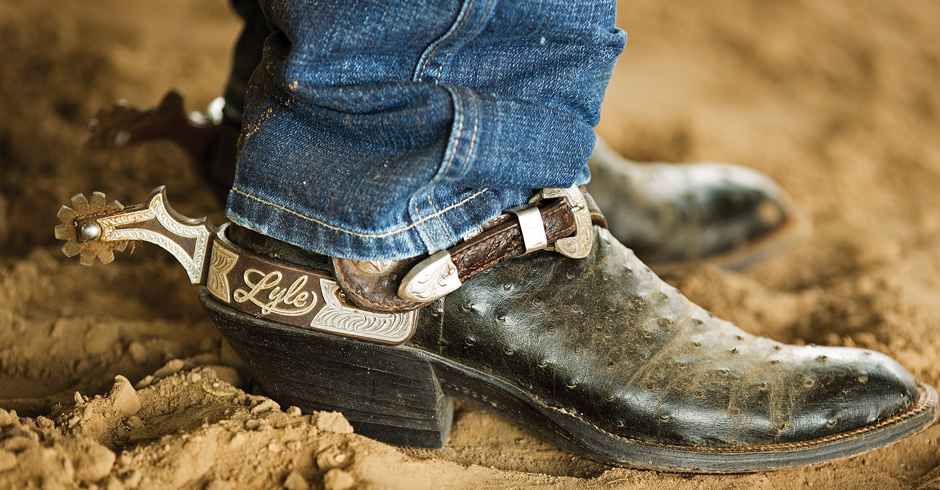
A Native Texan
Lovett is a born and bred Texan. He grew up surrounded by family farmland in Klein, Texas, located 30 miles north of Houston. He seems anchored there and still lives in the house his grandparents built in 1911. Horses were always part of his life, but Lovett said, “I was not a horse-show kid. I grew up going to the racetrack. My family was in the business of running Quarter Horses all my life.” His family also had a small running-Quarter-Horse breeding operation as he was growing up, and they still have a Quarter Horse on the track now.
“We were always trying to make riding horses out of our retired racehorses,” Lovett explained. But in the late 1990s he wanted to get his dad a really nice riding horse for Christmas and started looking around. That’s when he discovered reining horses.
“The first reining show I saw was right here at the Great Southwest Equestrian Center,” said Lyle. “I came to the Breeders Classic in 2001, a show that Tim and Colleen McQuay were instrumental in starting.”
Since then Lyle has partnered with the McQuays in the purchasing, training, and breeding of several reining show horses. “Their group, along with the McCutcheons, another revered family of reining champions, have built this entire enrollment program for foals that is just amazing,” said Lovett. “Colleen’s experience with her hunter jumper world has done wonders for extending the life of our show horses.” Lyle added, “In the hunter jumper world you don’t even start until they are 4, and you see horses showing on the Olympic level well into their teens.”
The biggest earning potential year for Quarter Horses is the futurity year, which, in the case of reiners, is 3 years old. Every year beyond that point yields diminishing returns. The McQuays have done a lot to build value into the derby years that include the 4-, 5-, and 6-year-olds. Some can compete at amateur level into their early 20s.
The derby years enable people to keep their horses in training for a longer time. Lovett told us his horses weren’t quite ready for the futurity. “We started a little bit late. My goal is to have good, sound, derby horses rather than putting all my eggs in one basket,” he said. “I decided to take a slower approach with these horses.”
Smart and Shiney
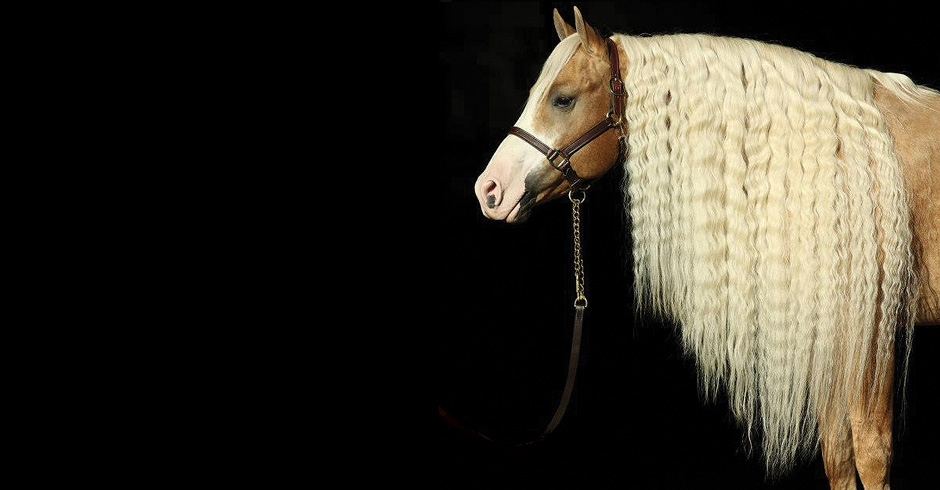
One of his pride and joys is his beautiful, dappled palomino stallion, Smart and Shiney. Lyle has shown him in exhibition and non-professional classes, while world-champion trainer and breeder Tim McQuay has ridden him to top-10 finishes and finalist-placings in open competition. In 2010, Smart and Shiney was loaned to team Italy—ridden by McQuay’s assistant trainer Marco Ricotta—at the World Equestrian Games in Lexington, Ky., and earned a team bronze. Lyle describes Smart and Shiney as the nicest horse he’s ever ridden. His horse has enjoyed a successful and lucrative career and now has the role of standing stud at McQuay Stables in Tioga, Texas.
It turns out Lyle has a soft spot for dogs too. He will be traveling to Wellington, Fla., this winter to partner with Danny and Ron’s Dog Rescue at their country-western fundraising event. Lyle will be a guest judge for a children’s team vocal competition.
I asked how often Lyle gets to ride, given his demanding concert tours and charitable work that have him performing and traveling more than 100 days a year. He said, “not enough, but I spend all the time that I can riding. I go to three or four shows a year.” That’s the most intensive riding he gets to do. Lyle added, “The McQuays have the horses so well trained and in such good condition. It’s the only way I can do it. Even with horses at home I don’t get to ride enough.”
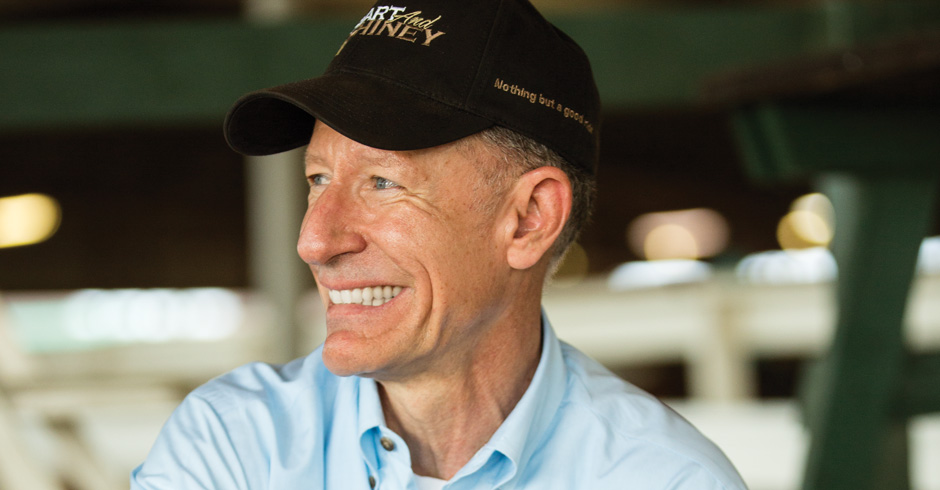
With more and more hunter jumper riders giving reining a try, it seemed plausible to ask if Lyle had done the reverse and given any English disciplines a try. “I’ve never been in an English saddle, but I would like to give it a try,” said Lovett. “I’ve never been aboard any of our racing horses on the track either. When I watch the hunter jumpers, it just looks so different to me,” he commented. “Here we ride on a loose rein and much of it is the willingness of the horse. It’s interesting to observe the difference.”
Lyle walked away with numerous first- place awards in the non-pro events during his days at the Heritage Futurity. “It’s always a challenge and there are always things you can do better,” said Lyle. “It’s such a test to feel your horse on a given day and be able to react on him. You can’t go into the show pen and think this is what I’m going to do.”
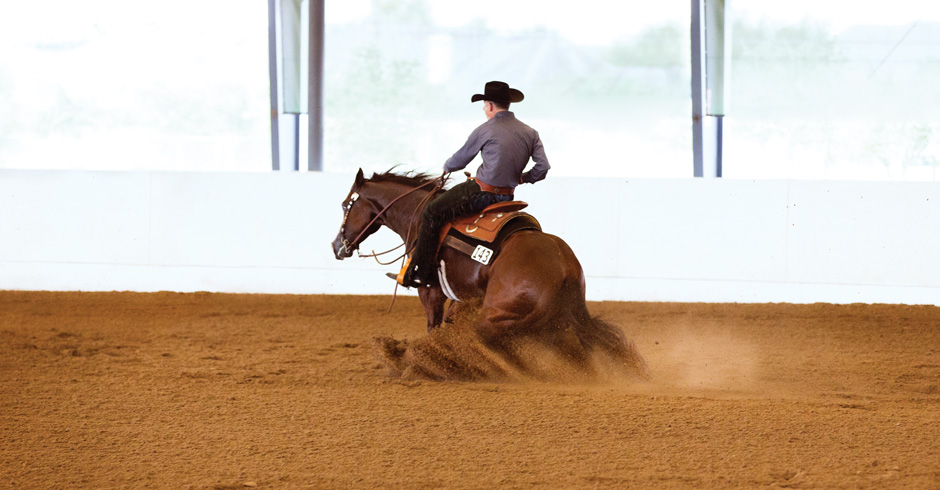
He is a quiet, graceful rider demonstrating perfect control even at faster speeds. Even his dizzying spins produced the desired appearance of spinning in place.
Lyle describes his style in the competition ring as basic, conservative, and understated. “The general rule is to coordinate your shirt and blanket. I just end up wearing dark colors,” said Lovett. “Even though you don’t get points for your style or have points taken away, it all goes to that overall picture.”
A MAN WITH STYLE
Lovett is a man who finds beauty in the details; he is studied and precise. He can tell you his boots were made by Lee and Carrlyn Miller in Austin, Texas, and that Lee was the last apprentice to the great old bootmaker, Charlie Dunn. He knows that his custom belt buckle—a gift from his fiancée—was made by Clint Orms, and that making subtle adjustments to the scallops and cuffs on a shirt design would produce a more desirable look. So much so that he now has a signature line of custom western shirts in collaboration with custom shirtmaker, Hamilton Shirts.
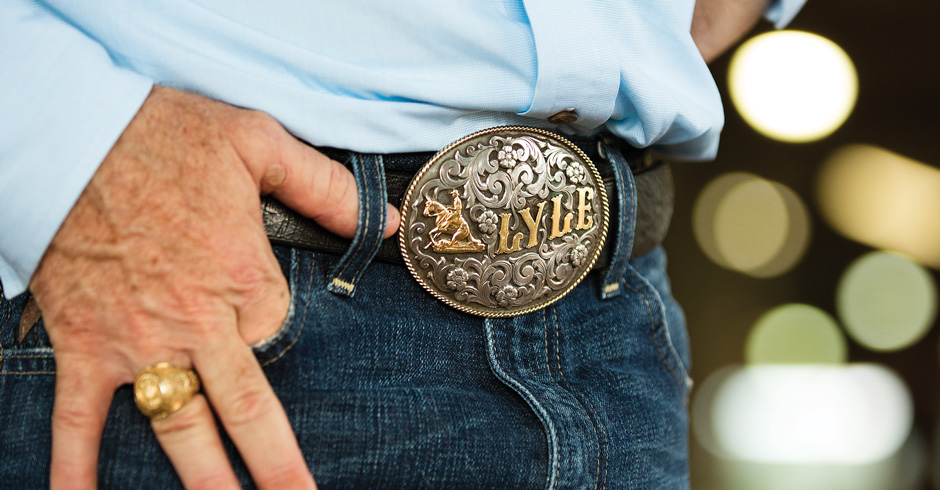
While speaking with Lyle about his perfectly shaped cowboy hat, he took it off to show me the inside and talked about Tony Matthews, the man who gave his hat the perfect contour. Shortly after that I read a piece about cowboy hat protocol. A cowboy claimed you can drop a hat, have it sit in the dirt and dust, and be trampled by cows and horses. But just don’t let a man touch it. There must be some credence to the tale, because Lyle wrote and titled a song “Don’t Touch My Hat.”
Horses also make their way into Lyle’s lyrics—literally, figuratively, and sometimes metaphorically. Lyle explained in an interview that in the song “Natural Forces,” the line “Home is where my horse is” conveys the message that home is where our responsibilities lie. Home is a place where we become who we are. Lyle is completely at home in Texas–reining, riding, spinning, and sliding.
So thank you ma’am, I must decline
For it’s on my 3-year-old I ride
An’ I’ve spin an’ run an’ stopped an’ slide
I’m subject to the natural forces
Home is where my horse is.
